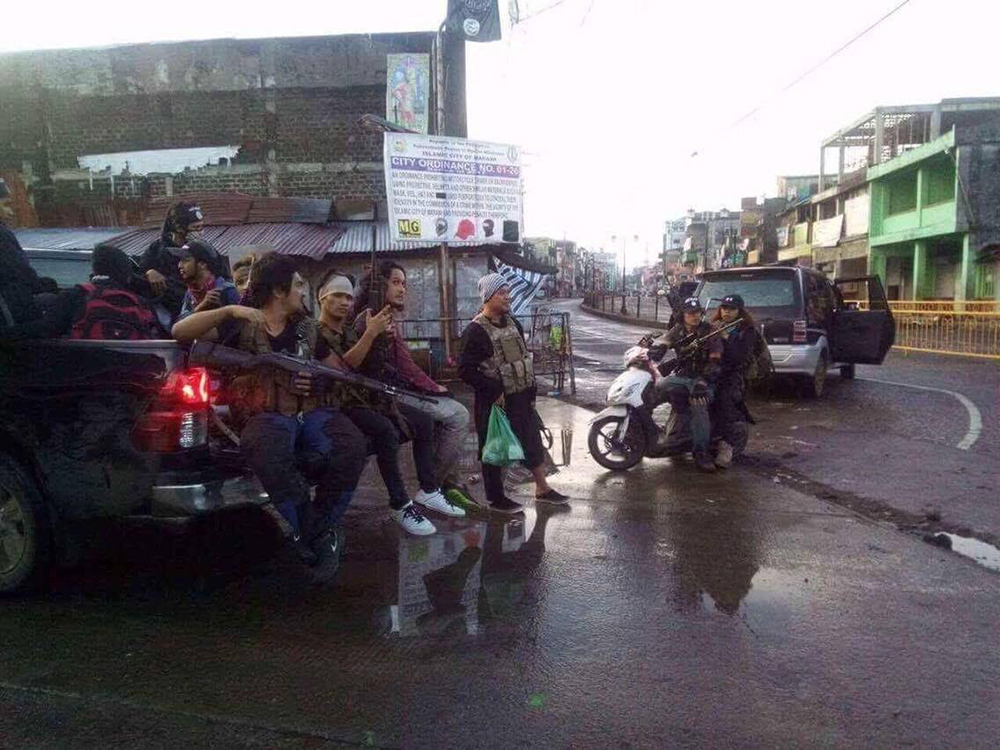ISIS central provided Marawi militants with funding, says report

A report released on Friday showed that the so-called ISIS central command in the Middle East provided funding to militants still entrenched in parts of Marawi City. Lawyer Maki Datu-Ramos, File
MANILA, Philippines — The almost two-month old battle for Marawi may have been abetted by tens of thousands of dollars of financial support from the central command of the so-called Islamic State of Iraq and Syria, a report released on Friday said.
Central to this operation of linking local Islamist militants still entrenched in Marawi and the central command of the so-called ISIS in the Middle East is Dr. Mahmud Ahmad, a high-level militant leader from Malaysia, according to the report from the Institute for Policy of Analysis of Conflict.
Although ISIS central financial support to the local militants in the southern city was largely confined to periodic transfers of tens of thousands of dollars, it provides a crucial link between militants who are in retreat in the Middle East and those involved in the most serious security problem the government of President Rodrigo Duterte has faced so far.
Local funding, mainly from locals resentful of the “brutality” of Philippine security forces, also played a significant, if not more prominent, role in helping the siege of an Islamic city in the heart of Mindanao island.
“Funds for the Marawi operation came both directly from ISIS central as well as local sources,” said the IPAC report.
Duterte in May revealed that the government was able to detect money transfers from ISIS to Supt. Maria Cristina Nobleza, arrested in April for trying to help her alleged Abu Sayyaf lover to escape police and military operations in Bohol.
Duterte also claimed that drug money was helping fund terror activities, but the report based on visits to Mindanao, interviews with people and obtained messages from militants said that the president did not provide evidence for this.
READ: Fact checking Duterte’s Maute claims
According to the report, Ahmad facilitated the transfer of funds from Syria through Indonesia to the Philippines through Western Union several times between January and May this year.
“The transfers through Indonesia were likely used for the Marawi operations, but raise the question of what other transfers took place through Indonesia or other countries that have not yet been discovered,” it said.
For the first few transfers, Ahmad contacted Achmad Supriyanto alias Damar, a JAD member in Banten, Indonesia who had taken a short training course in Basilan May last year. JAD is an ISIS-lined Indonesian terrorist cell.
READ: Inaccuracies seen in SolGen Calida's ISIS cells list
In January, Ahmad communicated with Damar to solicit his help in getting funds from Syria to the Philippines and gave him a Telegram account to contact.
Then the person told Damar to go to an East Java town to pick up the $10,000 from a man. After this, the Malaysian militant told him to send the money to several trusted recipients in the Philippine through Western Union.
Another transfer was made in February this year, and this time Damar was instructed to go to Bogor, West Java to meet another funding contact.
Damar got $25,000 cash from the person and sent this to Filipino recipients again via Western Union.
“In March, Dr. Mahmud [Ahmad] informed Damar that another tranche of $20,000 had arrived in Indonesia and asked him to contact a JAD operative in Syria named Munawar,” the report said.
Munwar then instructed Damar to go to Bekasi and get the money from a person whose Telegram name he was given.
“Damar made the pick-up and sent the funds on to contacts in the Philippines,” it said.
Damar was arrested in March, but another man, Rohmat Septriyanto of Tegal, Indonesia, took his place until he was captured in late May.
Local funding also played a crucial role, the report said, shedding light on the degree of local support enjoyed by the militants, an aspect of the fighting that had been all but ignored by Philippine authorities.
“Tracing the local funds may provide clues to one aspect of the fighting that has been all but ignored by Philippine authorities- the degree of local support beyond traditional clan ties,” it said.
Recruitment in the name of ISIS took place on university campuses across Mindanao, including through Muslim student associations and their alumni at Catholic institutions, state universities and polytechnic institutes, it said.
It said that the brutality of the military and the police was a major theme in recruitments.
Many of the recruited young people were from wealthy families who could substantially contribute to militant funds.
“Pro-ISIS groups also reportedly raised funds through supporters working at Muslim charities and dakwah centres, though not necessarily with knowledge or approval of the organizations involved,” it said.
The siege of Marawi City started on May 23 after a failed attempt by Philippine security forces to arrest Isnilon Hapilon, an Abu Sayyaf sub-leader. The authorities encountered strong resistance and the violence quickly escalated, prompting Duterte to declare martial law in Mindanao later in the day.
Security officials, during the first few days, said that the situation was under control, but almost two months into the battle fighting still continues in the city.
Defense Sec. Delfin Lorenzana admitted that the government had underestimated the scale of the problem in the city after the military and the police failed to meet several self-imposed deadlines.
- Latest
- Trending





























